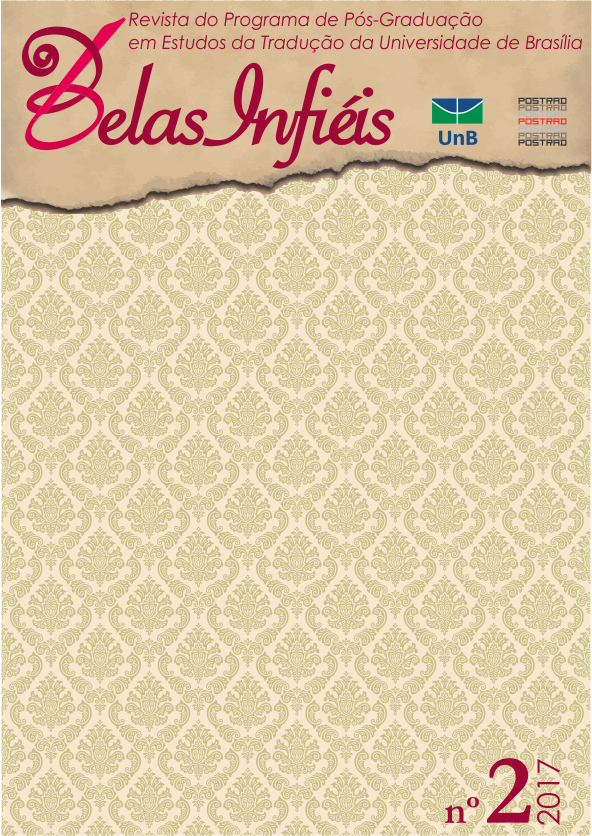A LITERATURA ALEMÃ DE WOLFGANG MENZEL, RESENHADA POR HEINRICH HEINE:
TRADUÇÃO COMENTADA
DOI :
https://doi.org/10.26512/belasinfieis.v6.n2.2017.11461Mots-clés :
Heinrich Heine, Jovem Alemanha, Recepção de Goethe, Wolfgang MenzelRésumé
Die deutsche Literatur von Wolfgang Menzel (1828) não é apenas uma das resenhas mais conhecidas de Heinrich Heine, mas também um importante documento sobre a cultura alemã em sua fase de transição do romantismo para a literatura da Jovem Alemanha (Junges Deutschland). O presente artigo, além de trazer a tradução integral do texto em questão, faz uma leitura que visa a evidenciar as principais tensões vividas por escritores naquele momento de assumida estagnação cultural e censura política. Heine se vale do registro da resenha para propor um programa estético inovador, e o faz declarando o final do Período da Arte (Kunstperiode) representado por Johann Wolfgang von Goethe e os teóricos do romantismo.
Téléchargements
Références
BÜTTNER, Frank. Der Streit um die ‚Neudeutsche Religios-Patriotische Kunst‘. Aurora, n. 43 (1983), p. 55-76.
DREWITZ, Ingeborg. „Wir müssen etwas tun, was Ersatz ist für das, was wir tun könnten. Die Autoren des Jungen Deutschland und Goethe“. In: BUCH, Hans Christoph. Literatur-magazin 2. Von Goethe lernen? Fragen der Klassikrezeption. Hamburg: Rowohlt Taschenbuch Verlag, 1974, p. 113-119.
FRANK, Hilmar. „Anzeigen, Kritiken, Rezensionen zur bildenden Kunst“. In: DAHNKE, Hans-Dietrich & OTTO, Regine. Goethe Handbuch, Bd. 3. Stuttgart / Weimar: J. B. Metzler, 2004, p. 640-654.
GUTZKOW, J. Karl. Wolfgang Menzel und das „Junge Deutschland“. Neue Freie Presse. Wien. Nr. 3153, 4. Juni 1873, p. 1-3.
HABERMAS, Jürgen. Heinrich Heine e o papel do intelectual na Alemanha. Tradução de Priscila Figueiredo e Luiz Repa. Cadernos de Filosofia Alemã, n. 3, p. 79-105, 1997.
HÄNTZSCHEL, Günter. Das Ende der Kunstperiode? Heinrich Heine und Goethe. (2003). In: Goethezeitportal. Disponível em: <http://www.goethezeitportal.de/db/wiss/epoche/haentzschel_kunstperiode.pdf>. Acesso em: 11/01/2017).
HEINE, Heinrich. Die deutsche Literatur von Wolfgang Menzel. 2 Theile. Stuttgart, bei Gebrüder Frankh. 1828. Neue allgemeine politische Annalen. Bd. 27, 1828, Heft 3, p. 284-298. Versão facsímile disponível em <https://www.uni-due.de/lyriktheorie/scans/1828_heine.pdf >. Acesso: 11/01/2017.
_____________. Die romantische Schule. Hamburg: Hoffmann und Campe, 1836. Versão facsímile disponível em <https://books.google.com.br/books?id=VqkDAAAAQAAJ>. Último acesso: 14/01/2017.
_____________. Säkularausgabe. Werke, Briefwechsel, Lebenszeugnisse. Band 20: Briefe 1815-1831. Berlin: Akademie-Verlag, 1970.
_____________. Contribuições à História da Religião e Filosofia na Alemanha. Tradução Márcio Suzuki. São Paulo: Iluminuras, 1991.
HOHENDAHL, Peter Uwe. “The Epoch of Liberalism, 1820-1870”. In: HOHENDAHL, Peter Uwe (org.). A History of German Literary Criticism: 1730-1980. Lincoln / London: University of Nebraska Press, 1988, p. 179-276.
HÖHN, Gerhad. Heine Handbuch. Zeit, Person, Werk. Stuttgart/Weimar: Verlag J.B. Metzler, 2004.
IMMERMANN, Karl. Werke. Herausgegeben von Benno von Wiese, Band 1, Frankfurt a.M. / Wiesbaden: Athenäum, 1971.
KOPELEW, Lew. Ein Dichter kam vom Rhein. Heinrich Heines Leben und Leiden. Berlin: Severin und Siedler, 1981.
LAUSTER, Martina. Vom Körper der Kunst. Goethe und Schiller im Urteil Heines, Börnes, Wienbargs und Gutzkows (1828-1840). Goethe Jahrbuch, Band 122. Göttingen: Wallstein Verlag, 2005, p. 187-201.
OROSZ, Magdolna. Heine und die deutsche Romantik. Arbeiten zur deutschen Philologie, XXVI, 2002, p. 105-122.
SAFRANSKI, Rüdiger. Romantismo: uma questão alemã. Tradução Rita Rios. São Paulo: Estação Liberdade, 2010.
VERBOT DER SCHRIFTEN DES »JUNGEN DEUTSCHLAND « vom 10. Dezember 1835 (31. Sitzung der Bundesversammlung, 1835). Disponível em: <http://www.heinrich-heine-denkmal.de/dokumente/beschluss.shtml>. Acesso em: 14/01/2017.
Téléchargements
Publié-e
Comment citer
Numéro
Rubrique
Licence
Copyright Statement
Given the public access to this journal, the texts are free to use but requires the recognition of the original authorship and initial publication in this journal to be properly stated.
The journal allows the use of works published for non-commercial purposes, including the right to submit the work to publicly accessible databases. Published contributions are the sole and exclusive responsibility of the author(s).
- When submitting papers to be evaluated by the Belas Infiéis journal, the author(s):
- Declare that the contents of the contributions are original and of their original creation, being entirely responsible for their content if there is an objection by third parties.
- Claim to be aware that they should not commit academic plagiarism.
- Declare that the manuscript has not been published, completely or partially, in Portuguese or another language. If it is a translation it should be submitted to the Translated Articles section.
- Declare that the manuscript is not being evaluated by other journals.
- Declare that the manuscript was not submitted to another journal simultaneously.
- Commit(s) to inform the journal of any kind of error or inaccuracy in their contribution (published, in evaluation or in editing) and to collaborate with the editors to make due corrections of the article (when in evaluation or editing) or erratum/retraction (after publication).
- Declare that there is no conflict of interest regarding the published work.
- Authorize its release if it is accepted for publication without any kind of monetary compensation.
- Agree to assign non-exclusive rights to publication to the magazine, remaining free to make their contribution available in other media as long as the publication of the first version in Belas Infiéis magazine is mentioned. They also authorize Belas Infiéis to assign their texts for reproduction in content indexers, virtual libraries and similar platforms.
- Maintain copyright and grant the journal the right of first publication, the work being licensed under theCreative Commons Attribution License.
- Is/Are allowed and encouraged to publish and distribute their work online after the editorial process, which may increase the impact and citation of the published work.
- Authorize the editorial team to make textual adjustments and to adapt the article to the publication rules, when necessary.



















